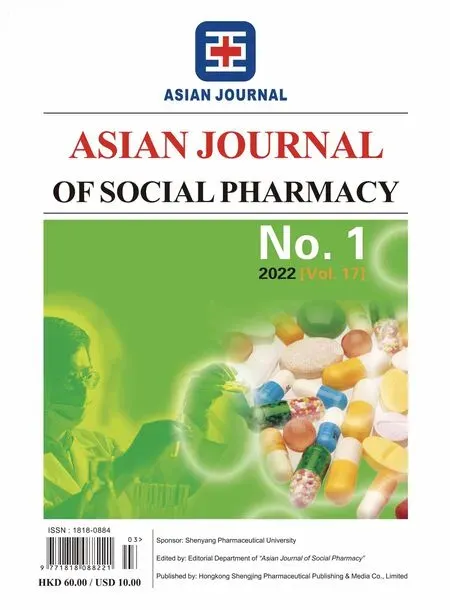Design of Pharmaceutical Care Process for Retail Pharmacies Based on Pareto Analysis
2022-03-20AnLianyuLiuLinchuanWangShuling
An Lianyu,Liu Linchuan,Wang Shuling
(School of Business Administration,Shenyang Pharmaceutical University,Shenyang 110016,China)
Abstract Objective To study the problems of pharmaceutical care in retail pharmacies and provide reference for the standardized development of pharmaceutical care in China.Methods Based on the literature of CNKI database,Pareto analysis was used to study the present situation of pharmaceutical care in retail pharmacies.Then the following problems in pharmaceutical care were found such as low personnel professional quality,inadequate attention,imperfect laws and regulations,and lack of standard service process.As to the first three problems,there were more research references.But there was less literature on the standard care process.Results and Conclusion Focusing on the customer demand,taking drug sales process as the basic framework of pharmaceutical care standardized process,and combining with the collaboration,the service process including prescription drugs review and OTC drugs purchase consultation is established.This process elaborates the division of staff services as well as the service standards in pre-sale,on-sale,and after-sale stages.Besides,it also puts forward some advice for the previous three problems,which will ensure the smooth implementation of pharmaceutical care in drugstores.
Keywords:retail pharmacy;pharmaceutical care process;Pareto analysis
In recent years,the incidence of chronic diseases among Chinese residents has been increasing every year.As a result,the demand for pharmaceutical care is on the rise,too.However,most medical institutions cannot meet the needs of the public,and pharmaceutical care in retail pharmacies becomes another source for them[1].Based on Pareto analysis of the existing literature,it is found that the problems of pharmaceutical care in pharmacies can be divided into the following four categories:service personnel problems,insufficient attention,imperfect laws and regulations,and lack of standardized service procedures.Domestic researchers have had rich research results on the first three kinds of problems,but there are few research fields on the standardization of pharmaceutical care process in retail pharmacies.Therefore,this paper is a supplementary study on the existing problems in retail pharmacies.It takes the standardized process of pharmaceutical care as the entry point to conduct the study,aiming to build the standardized process of pharmaceutical care in retail pharmacies and provide reference for the future development of pharmaceutical care in retail pharmacies.
1 Concept of pharmaceutical care
1.1 Concept of pharmaceutical care in retail pharmacies
The widely accepted definition of pharmaceutical care was jointly completed by Hepler and Strand in 1991,which refers to the provision of direct and responsible drug treatment services to improve the quality of patients’ life[2].Pharmaceutical care is a broad concept,referring to a series of pharmaceuticalrelated services that are provided for the safety and health management of patients’ medication.
At the end of the 20th century,the concept of pharmaceutical care was introduced to China,but it was not clearly defined.People in retail pharmacies believed that pharmaceutical care only included some primary services such as drug supply,drug dispensing,and simple medication guidance,etc.With the increasing demand for healthy living standard,these primary services cannot meet the needs of consumers.Therefore,pharmaceutical care requires new development and extension.Pharmacists should change from dispensers to results-oriented and patient-centered pharmaceutical information providers.Pharmacists must assume more responsibilities and commitments by enhancing their knowledge and technical ability[3].In this paper,pharmaceutical care in retail pharmacies refers to a series of pharmaceutical-related services,such as drug storage,drug inspection,drug safety and quality management,consumer consultation on drug purchase,consumer consultation in the course of disease prevention or treatment,and direct or indirect drug treatment.
1.2 Pharmaceutical care personnel
In the traditional cognition,pharmaceutical care personnel are only pharmacists.But at present,consumers’ demand for service has extended to all practitioners of drugstores,including salespersons,cashiers,quality inspectors and others.In this paper,pharmaceutical care personnel refer to pharmacists in pharmacies and other practitioners who also offer pharmaceutical care in pharmacies.Centering on pharmacists,they make efforts to create highquality pharmaceutical care through division of labor,cooperation and joint efforts to guarantee the safety,effectiveness and economy of drug use for patients.
1.3 Transformation of pharmaceutical care concept
The original meaning of pharmaceutical care is to guide consumers to use medicine scientifically and rationally through pharmacists’ instruction,which can ensure the safety and effectiveness of medicine to the greatest extent[3].Combined with the actual situation of the development of retail drugstores in China,the significance of developing pharmaceutical care has become great.From the perspective of drugstores operation,developing pharmaceutical care can transform their old business philosophy of focusing on drug sales into promoting the rational drug use of consumers[4].Besides,it can change the economic benefit maximization of drug sales to the business development model of drugstores,which attaches equal importance to economic and social benefits.From the perspective of social development,with the increasing demand for a healthy living standard and the management of chronic disease,pharmaceutical care can ensure consumers’ life safety and health state[5].Therefore,the significance of pharmaceutical care is no longer limited to drug safety guidance,but to protecting consumers’ life and promoting their happiness.
2 Current situation of pharmaceutical care in retail pharmacies
2.1 Pareto analysis of pharmaceutical care problems in retail pharmacies
Using literature research method,taking CNKI database as data sources,with the theme of“retail pharmacies”“pharmaceutical care problems”and“the present situation of pharmaceutical care”,a total of 130 pharmaceutical care problems were retrieved within 30 articles from 2007 to 2019.According to Pareto analysis,the main problems of pharmaceutical care were studied and the following results were obtained (Fig.1).
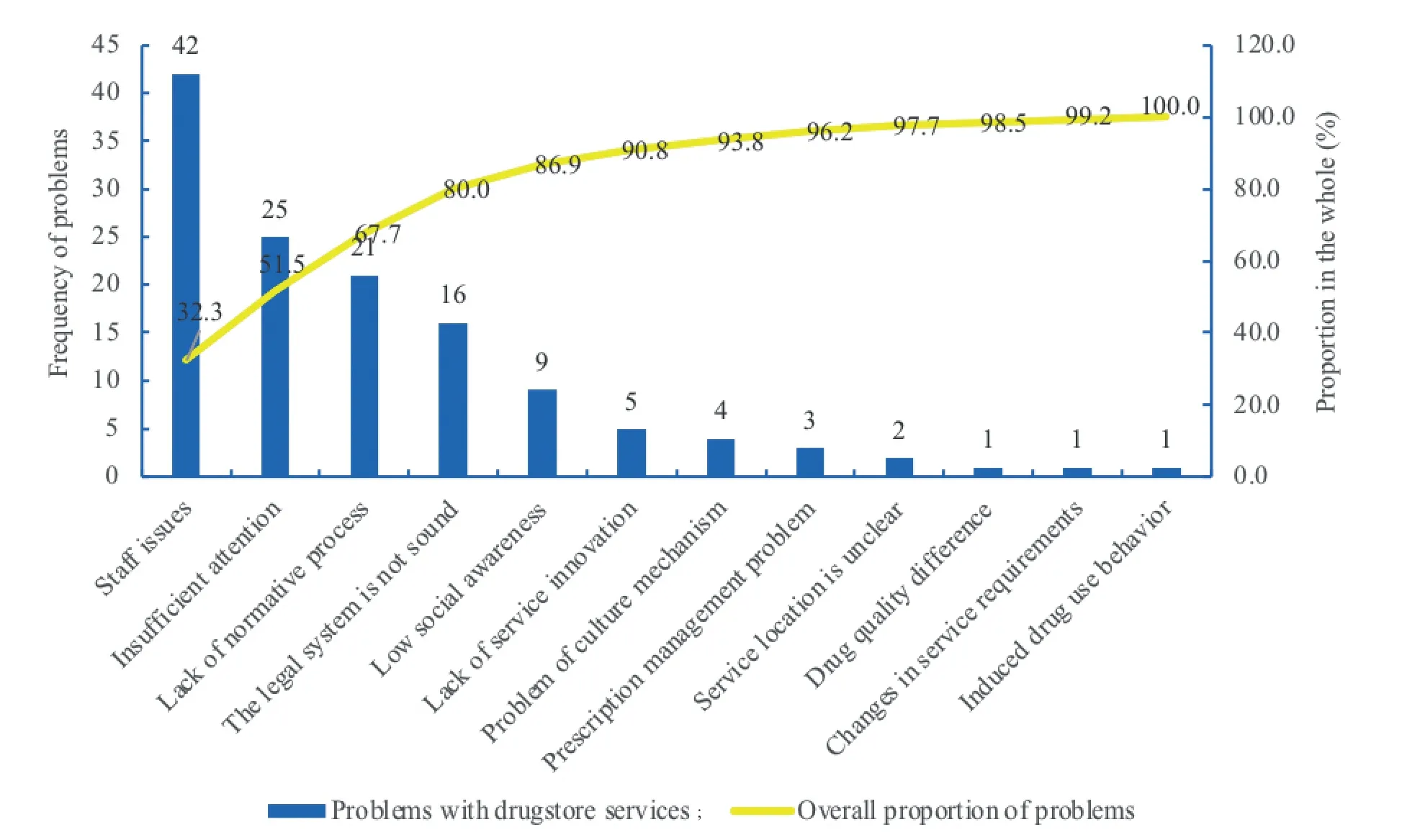
Fig.1 Accumulative pharmaceutical problems in retail pharmacies
According to Pareto analysis,the problem of pharmacy service personnel accounts for 32%,insufficient attention to pharmaceutical care accounts for 20%,imperfect laws and regulations account for 16%,and lack of standardized process of pharmaceutical care accounts for 12%.Since these four types of problems account for 80%,they should be solved urgently in the development of pharmaceutical care in China’s retail pharmacies.
2.2 Analysis of main problems of the service in retail pharmacies
2.2.1 Insufficient allocation of service personnel and bad sense of service in drugstores
The problem of the pharmacy service staff is the shortage of pharmacists.Besides,these pharmacists have low practicing ability with weak consciousness of service.Wheeler JS pointed out that with the transformation of pharmaceutical care mode,the role and function of pharmacists also changed.Then he proposed to strengthen the function of pharmacists,enhancing their education and training to improve their professional skills in the form of pharmacist legislation[6].Oshima S,et al.adopted the method of questionnaire survey to understand the evaluation of pharmacists by Japanese public after the revision of the“Pharmacist Law”and the evaluation of pharmacists themselves.They found that after the revision of the“Pharmacist Law”,patients wanted to get more professional pharmaceutical care,and pharmacist had to make greater efforts to narrow the difference with the expectations of patients[7].Domestic scholar,De Xianhui,et al.conducted an in-depth discussion on the insufficient allocation of licensed pharmacists in remote areas.Then he proposed to build a remote prescription review mechanism of licensed pharmacists and moderately relax the examination standards for licensed pharmacists in remote areas,which could alleviate the shortage of licensed pharmacists[8].For the low practice ability of licensed pharmacists,Li Wenhua and Li Baoquan put forward measures to improve the training mechanism of pharmaceutical professionals and the assessment system of licensed service ability of pharmacists,which would improve the professional ability of pharmacists and guarantee consumers’ safe and rational drug use[9].
2.2.2 Insufficient attention to pharmaceutical care
The lack of attention to pharmaceutical care is mainly caused by the low enthusiasm of drugstore operators and the lack of investment.Nazar H and Nazar Z used a mixed method to investigate and interview stakeholders from the northeast of England,and found that the current lack of evidence support for pharmacy services hindered its sustainable development.Then,he proposed that clear goals and standards of pharmaceutical care should be established to improve relevant systems of pharmaceutical care[10].Zhang Peipei,Jing Hao[11]and Li Man[12]analyzed this problem,and found two main reasons.On the one hand,the management department lacks relevant laws and regulations on pharmaceutical care in retail pharmacies,leading to operators’ wait-and-see attitude towards developing pharmaceutical care.On the other hand,the retail pharmacies don’t have the standards for process and service in pharmaceutical care.In addition,the operators lack the corresponding reference basis,which leads to their low enthusiasm in carrying out pharmaceutical care.
2.2.3 The laws and regulations related to pharmaceutical care are not sound
The imperfect laws and regulations on pharmaceutical care are manifested in the behavior of service,the compensation mechanism,and the management system of pharmaceutical service fees in retail pharmacies.AB Almarsdottir,et al.pointed out that the concept of clinical pharmacy and retail pharmacies was conducive to clarifying the positioning of pharmacists in the healthcare system and the important role of pharmacists in pharmacy practice.Then,they proposed that relevant systems of pharmaceutical care had to be established to improve the quality of pharmaceutical care[13].Domestic scholars,Wang Jian,Kang Zhen[14],and Xu Gan[15]also studied this problem,and put forward some suggestions on standardizing pharmaceutical care in retail pharmacies,adding pharmaceutical service compensation mechanism,and constructing management system of pharmaceutical service fees which could provide a reference basis for perfecting pharmaceutical care regulations in retail pharmacies.
2.2.4 Lack of standardized process
In the service process of retail drugstores,they don’t have a standard related to pharmaceutical care.Besides,the content of pharmaceutical care lacks systematic rules.There are few papers on domestic pharmaceutical care process.Li Weinie and Chen Yuwen[16]designed the preliminary pharmaceutical care process in 2006,which involved the pharmaceutical care content of drug dispensing and simple medication guidance.At present,the concept of pharmaceutical care has changed from focusing on drug supply to guiding the review of drug prescription and drug treatment.The preliminary pharmaceutical care process mentioned in the literature lacks the contents of prescription drugs and pharmaceutical care.Therefore,the existing preliminary pharmaceutical care process has been unable to meet the needs of consumers for life and healthy life,and a new pharmaceutical care model and service process should be constructed to adapt to the will of consumers.To sum up,this paper focuses on the pharmaceutical care process of retail pharmacies as the research entry point,aiming to build a complete and systematic pharmaceutical care normative process with consumers as the center and the principle of scientific,reasonable and implementable,so as to improve the quality and efficiency of pharmaceutical care and promote the further development of pharmaceutical care of retail pharmacies.
3 Design the process of pharmaceutical care in retail pharmacies
3.1 Principles of designing service process
3.1.1 Implementability
The design of pharmaceutical care process should follow the principle of implementability and keep the balance between the resources and the needs of consumers.On the premise of satisfying the needs of consumers,the optimal allocation of human resources and material resources of drugstores can be realized through the coordination,which can prevent the emergence of pharmaceutical care activities beyond the ability of staff.
3.1.2 Team management based on division of labor
In designing the process of service,not only the division of labor should be clear,but also the cooperation of different links should be achieved.The basic principle is the integrated management of the team.Clear division of labor enables pharmaceutical care providers to understand their job responsibilities and improve service quality.Cooperation can ensure the consistency of pharmaceutical care process and make consumers comfortable while receiving services.
3.1.3 Professional matching
Professional matching refers to the degree of matching between the contents of pharmaceutical care and the professional skill of pharmaceutical care providers.Pharmaceutical care involves pharmacists’ pharmaceutical skill and professional knowledge.Professional matching should be considered in designing the process of service to avoid the situation that employees cannot adapt to the post requirements.
3.2 Division of pharmaceutical care process and design of service content
3.2.1 Procedures for prescription and OTC pharmaceutical care
(1) Objective of pharmaceutical care process.According to the literature review,pharmaceutical care process designed by Levi is as follows:understanding the drug users → recommending safe,effective,reasonable and economical drugs →introducing medication methods to ensure medication safety→ establishing medication calendar → making regular follow-up visits.However,due to the rapid development of retail pharmacies and consumers’increasing demand for services,the service process has been unable to meet the requirements of consumers who purchase drugs in retail pharmacies.Consumers’demand for chronic disease management is on the rise,especially in prevention and diagnosis.Therefore,the goal of this paper is to meet the service needs of consumers,which include the provision of free testing activities,timely recommendation of medical treatment,drug treatment management and other services.Thus consumers can feel the good experience of pharmaceutical care process,which will achieve the goal of protecting consumers’ health and safety.
In this paper,designing the process of pharmaceutical care is based on the drug sales process,and the whole pharmaceutical care content is divided into three stages.They are pre-sale pharmaceutical care,on-sale pharmaceutical care,and after-sale pharmaceutical care.A new standardized process of pharmaceutical care is constructed to carry out the management of pharmaceutical care in retail pharmacies.The simple service process is as follows:pre-sale pharmaceutical care → on-sale process pharmaceutical care → after-sale pharmaceutical care.
(2) Items and contents of prescription drug service.The flow chart of pharmaceutical care for prescription drugs is shown in Fig.2.
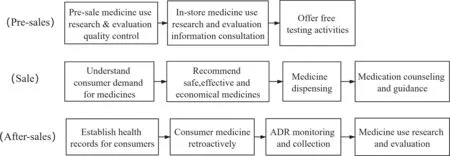
Fig.2 Flow chart of pharmaceutical care for prescription drugs in retail pharmacies
(3) Items and contents of OTC drugstore service.There is no prescription review and evaluation process in the sales of OTC drugs.Prescription review and drug adjustment can be used to recommend cost-effective drugs for consumers’ demand.Therefore,the flow chart of OTC pharmaceutical care is shown in Fig.3.
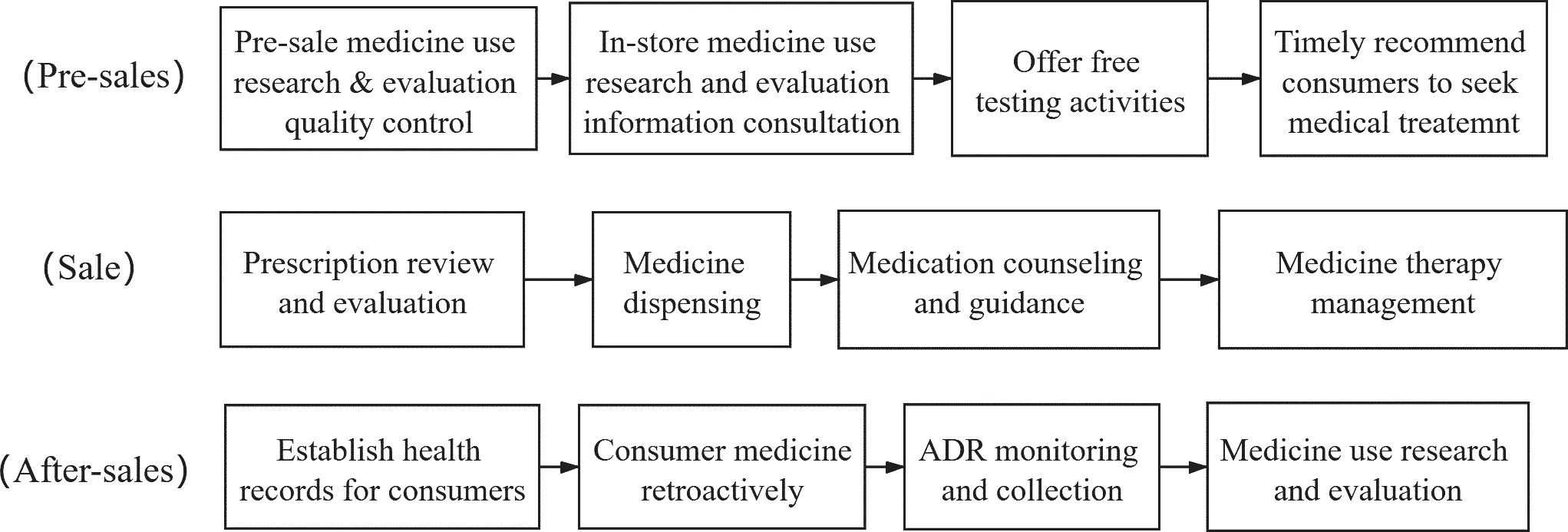
Fig.3 Flow chart of pharmaceutical care for OTC drugs
3.2.2 Service contents in different links of pharmaceutical care
(1) Contents of pre-sale pharmaceutical care.In the stage of pre-sale pharmaceutical care,retail pharmacies first need to inspect the quality of drugs,completing the pre-sale quality management to ensure the safety of drugs.Then they must understand the needs of consumers coming to the stores,and complete the preliminary diagnosis of the disease,etiology and other factors,which will provide a reference for consumers to purchase the drugs they need.The process of pre-sale pharmaceutical care is as follows:pre-sale pharmaceutical quality management→ drug information consultation in the store →providing free testing activities → recommending drugs to consumers in time.
(2) Contents of pharmaceutical care in the onsale process.Prescription and OTC drugs are sold in different ways.Prescription drugs must be reviewed by pharmacists.Therefore,prescriptions held by customers should be reviewed and evaluated in the first place.When the verification is correct,the corresponding drugs will be sold to the customers.Meanwhile,the customers are informed of drug efficacy,method of use,and side effects.Normally,a detailed written guide will be given to consumers.The pharmaceutical care process of prescription drugs sale is as follows:prescription review and evaluation→ drug dispensing → medication consultation and guidance → medicine therapy management.
OTC products are safer for consumers to use and can be purchased without a prescription.The content of OTC pharmaceutical care is to understand consumers’ demands.Then,several types of drugs can be listed for customers to choose the most economical and effective one.After that,consumers are informed of the usage and dosage of drugs purchased to ensure the safety of drugs.The process of pharmaceutical care in OTC drug sales is as follows:understanding consumers’ demand for drugs → recommending safe,effective and economical drugs → dispensing drugs→ guiding drug use.
(3) Contents of after-sale pharmaceutical services.The after-sale pharmaceutical service of retail drugstores should record the situation of consumers’ drug use to provide a reference for their future purchase of drugs.Then,the drug use of consumers is tracked,and the unreasonable drug use will be corrected and adverse drug reactions are collected.Finally,problems that occur in the process of consumers’ drug use are studied and evaluated to provide information on drug use for relevant departments and manufacturers.The process of aftersale pharmaceutical care is as follows:establishing health records for consumers → tracing of consumer drug use → monitoring and collecting adverse drug reactions → research and evaluation of drug use.
4 Personnel allocation and service standards of pharmaceutical care process
Scientific and reasonable division of labor in pharmacy pharmaceutical care can improve service quality and efficiency.Therefore,rational division of labor should be carried out among pharmaceutical care providers to promote the high-quality and efficient development of pharmaceutical care.
4.1 Responsibilities and service standards for pharmaceutical care personnel
The quality management of drugs should be completed by quality inspectors and storage personnel.Quality inspection personnel shall be responsible for the quality acceptance of drug procurement.Because of the standardization of acceptance,the quality and safety of purchased drugs can be guaranteed before storage.The warehousing personnel are responsible for the quality management of drug storage.They should register the purchased drugs,classify different categories of drugs,and ensure the corresponding storage environment for drugs with different storage methods.Besides,they have to track and manage the drugs on the shelves,and remove the drugs beyond the validity period to ensure their quality and safety.Therefore,these two groups cooperate to guarantee the pre-sale quality management of drugs.
Drug consultation and free testing for customers can be done by pharmacy assistants.Shop assistants who are familiar with different types of drugs in pharmacies can provide detailed drug consultation services for consumers.First of all,they should have a preliminary understanding of consumers’demand for drugs.Then,they can provide them with professional and accurate drug information.Secondly,they can guide consumers to use daily treatment instruments after properly evaluating consumers’health,and provide professional advice.Finally,they can determine whether the consumers should go to the hospital for a more comprehensive diagnosis and treatment.
4.2 Responsibilities and service standards of pharmaceutical care personnel in the sales process
Professional matching factors such as prescription review and evaluation,drug dispensing,medication consultation and guidance in pharmaceutical services should be taken into account,which can be completed by pharmacists.Pharmacists should use their professional knowledge to review and evaluate the prescriptions hold by consumers before they can get the drugs.After that,they should also give consumers some guidance on medication methods,precautions and contraindications.They had better form a written guidelines for customers so that they can guarantee the rational drug use.
As to pharmaceutical service of OTC drugs,pharmacy personnel should recommend safe,effective and economical drugs according to consumers’purchase intention and actual situation.These services can be completed by salespersons.After the drug dispensing,pharmacists will guide consumers to use drugs rationally with the information of the usage and dosage of drugs.Besides,they should inform the customers of the compatibility of drugs and food taboos.For example,vitamin C tablets cannot be used with seafood.
In addition,the service personnel should be enthusiastic in the service process,listen to consumers’demands carefully,to provide the best pharmaceutical care guidance based on consumers’ wishes.
4.3 Responsibilities and service standards of pharmaceutical care personnel in after-sale stage
The establishment of health records for consumers and the tracking of consumer drug use can be completed by the pharmacy personnel.After recording the information of consumers’ purchase of drugs,their health files should be established,which will provide the basis for consumers to purchase medicine again.Then they can track the situation of consumers’ drug use through regular communication with them.
Adverse drug reaction monitoring and collection,drug use research and evaluation should be done by the cooperation of pharmacists and cashiers in pharmacies.The cashier shall report the collect consumers’ medication information to the pharmacists,who shall then design and provide effective pharmaceutical tracking and monitoring to prevent adverse drug reactions caused by improper drug use.Meanwhile.They also monitor and collect adverse drug reactions,conduct research and evaluation on drug utilization,and provide information for relevant departments and manufacturers.The flow chart of division of pharmaceutical care providers in retail pharmacies is shown in Fig.4.
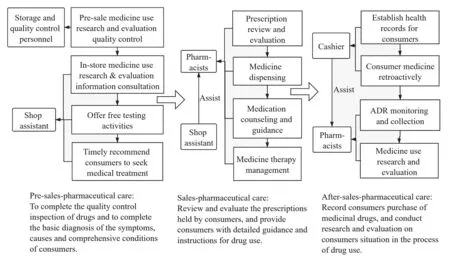
Fig.4 Flow chart of division of pharmaceutical care providers in retail pharmacies
5 Notes for the implementation of pharmaceutical care in retail pharmacies
5.1 Pharmaceutical care instruments and file management system shall be equipped
An exclusive area for pharmaceutical care should be set up in retail pharmacies.On the one hand,this area is equipped with professional file management system,which can record consumers’health conditions.With the aid of modern information technology,the contents of pharmaceutical care can be expanded.For example,microblogs,WeChat and other network information channels can be used to promote rational drug use and provide professional medical consulting services.On the other hand,basic medical equipment such as blood pressure meter,thermometer and blood glucose meter can provide consumers with more free value-added services.
5.2 Staffing of pharmaceutical care
Retail pharmacies must take pharmacists as the core to carry out pharmaceutical care because they can use their expertise for consumers.During the service process,at least one pharmacist shall be stationed in the pharmacy to provide professional pharmaceutical knowledge.At the same time,he can coordinate with other drugstore staff to offer the best pharmaceutical care.At present,retail pharmacies generally do not have full-time customer service positions.But the aftersales tracking and feedback are carried out through many times of communication,because it is necessary to conduct unified tracking,statistics and processing of consumers’ drug use.In particular,there is great potential for drug online sales.The cashiers cannot solve some technical problems in information communication,tracking,statistics and processing.In the short term,cashier staff can cooperate with pharmacists to these problems.However,from the development trend of drugstores,it is urgent for chain drugstores to have fulltime regional customer service personnel.
6 Discussions and suggestions
The purpose of this paper is to improve the quality and efficiency of pharmaceutical care and promote the rational and healthy development of pharmaceutical care.The implementation of pharmaceutical care process depends on the following aspects.First,legislation is the guarantee of developing pharmaceutical care.A sound law and system on pharmaceutical care can ensure the feasibility of pharmaceutical care in pharmacies,which will help pharmaceutical care process to be carried out smoothly.Secondly,the capability of licensed pharmacists is the basis for the implementation of pharmaceutical care process.Therefore,improving the capability of licensed pharmacists will guarantee pharmaceutical care and its service process.Third,the cooperation of consumers can motivate the enthusiasm of service staff in pharmaceutical care process.Besides,and the supervision from consumers can ensure the quality and efficiency of pharmaceutical care.Therefore,the following suggestions are put forward for the effective implementation of pharmaceutical care process.
6.1 Speeding up the legislative process of pharmaceutical care
One of the important reasons for the lack of relevant laws and regulations is that drugstore operators do not pay enough attention to pharmaceutical care.A sound legal system can ensure the smooth development of pharmaceutical care in retail pharmacies.In addition,the responsibilities and rights of licensed pharmacists also need to be stipulated and protected by law.However,the industry self-discipline standard“Good Pharmacy Practice”is not compulsory in China,it has been only implemented in the developed cities so far.In the new“Regulations on Professional Qualification System of Licensed Pharmacists”and“Interim Measures for the Administration of Continuing Education for Licensed Pharmacists”of 2019,the qualification examination,responsibilities,supervision and continuing education of licensed pharmacists are clearly stipulated.However,these regulations only encourage licensed pharmacists to participate in pharmaceutical care,and there is no clear words for punishment if they don’t.Whether licensed pharmacists carry out pharmaceutical care is up to their own decision,lacking certain binding force.Therefore,the establishment of a binding reward and punishment system for pharmacists can ensure the feasibility of pharmaceutical care in retail pharmacies.
6.2 Reforming the training mode of pharmaceutical professionals in colleges and universities
From the perspective of the cultivation of pharmaceutical professionals in colleges and universities,the current pharmaceutical education mode should be reformed.At present,the training objectives of pharmaceutical professionals in most domestic colleges and universities are similar to those of pharmaceutical preparations and pharmaceutical engineering.They pay much attention to the skills training in drug production,research and development,which lacks courses in clinical practice and pharmacotherapeutics.In order to cultivate pharmaceutical talents with solid basic theory,strong practical ability and high humanistic quality,the curriculum of clinical pharmacy should be added to the professional curriculum,including pharmacy professional knowledge,anatomy and physiology,drug interaction,primary diagnosis and drug treatment.This will strengthen the basic medical knowledge of pharmacists.In addition,we should expand practice channels,increase practice teaching courses,build a perfect practice teaching system,and strengthen the practice ability of pharmacists.
6.3 Improving the continuing education system of licensed pharmacists
It is the first step for pharmacists to obtain their qualification certificates through the examination.But the licensed pharmacist continuing education is a basic system that makes the majority of licensed pharmacists adapt to the needs of pharmaceutical services,comprehensively improve their practice ability,and realize lifelong education and career development.Therefore,it is necessary to establish the continuing education and training system of licensed pharmacists.The perfect continuing education and training system of licensed pharmacists should include two aspects.One is to improve their professional knowledge.Licensed pharmacists can gain pharmaceutical care knowledge by participating in lectures,collective research and personal training.Once they complete the required contents and credits,licensed pharmacists can get the relevant certificates with different levels of professional knowledge,such as primary,intermediate and senior levels of certificates.The other is that pharmacists should improve their professional practice ability.Therefore,pharmacies can establish a targeted and practical training system according to the development of the industry and social needs,which will provide skills improvement training,professional qualification certification training and other forms of training to pharmacists.
6.4 Improving consumers’ cognition of pharmaceutical care
To improve consumers’ awareness of pharmaceutical care,we should strengthen the publicity of licensed pharmacists and knowledge related to pharmaceutical care.Through regular lectures on basic drug use,daily health care,drug preservation and management in nearby communities,issuing rational drug use leaflets,and publicizing health knowledge such as chronic diseases of the elderly,consumers’ awareness of pharmaceutical care will be improved.Besides,we should improve consumers’ awareness of drug safety.It is not enough to rely on the unilateral power of licensed pharmacists to improve rational drug use.Patients should know the importance of drug safety and rational use,and actively cooperate with pharmacists to carry out relevant work.Only with the effective cooperation of pharmacists and consumers can the safety and effectiveness of drugs be guaranteed to the greatest extent.
杂志排行
亚洲社会药学杂志的其它文章
- Research and Suggestions on the Development of Smart Hospital -Taking Hospital A in Liaoning for Example
- The Development Opportunities and Dilemmas of Telemedicine-Base on the Perspective of Medical Resource Distribution
- Development Status and Enlightenment of Precision Medicine in China
- A Review of the Development and Effect of Contraceptive Counseling After Abortion
- Study on the Application of Quality Risk Management on Drug Collinear Production
- Analysis and Enlightenment of Pediatric Drug Registration Data in China
